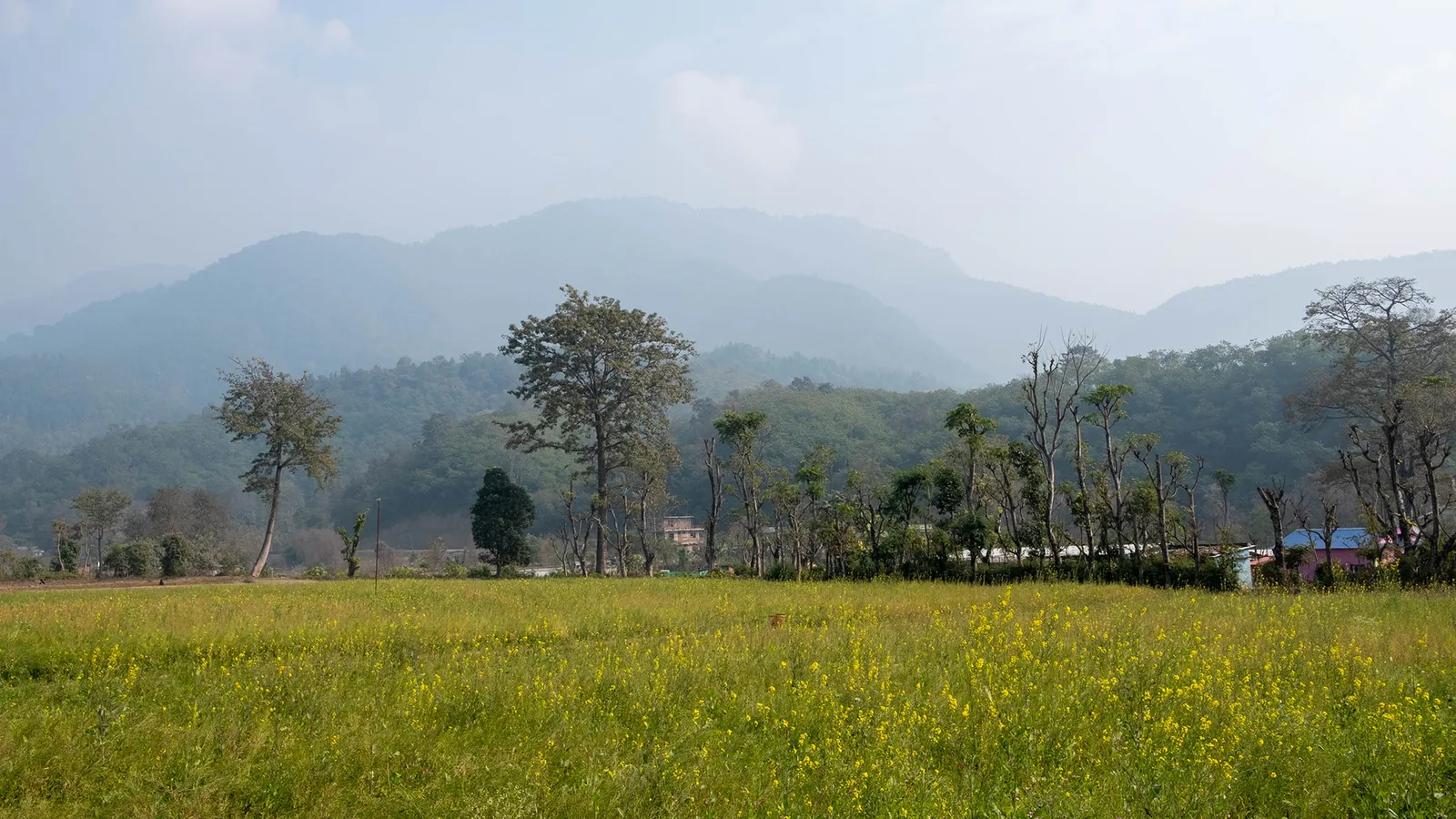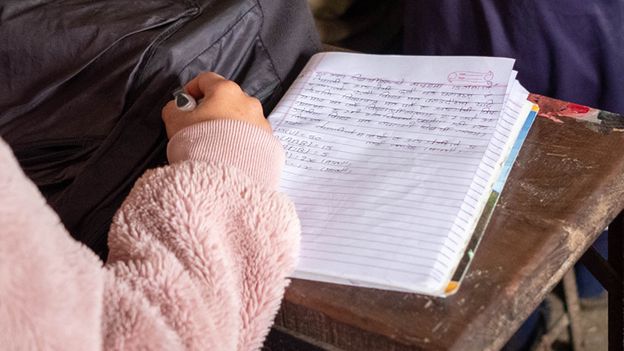Nepal's Kusunda language has no known origin and a number of quirks, like no words for "yes" or "no". It also has only one fluent speaker left, something linguists are racing to change.
Through the winter mist of the hills of the Terai, in lowland Nepal, 18-year-old Hima Kusunda emerges from the school's boarding house, snug in a pink hooded sweatshirt.
Hima is one of the last remaining Kusunda, a tiny indigenous group now scattered across central western Nepal. Their language, also called Kusunda, is unique: it is believed by linguists to be unrelated to any other language in the world. Scholars still aren't sure how it originated. And it has a variety of unusual elements, including lacking any standard way of negating a sentence, words for "yes" or "no", or any words for direction.
According to the latest Nepali census data from 2011, there are 273 Kusunda remaining. But only one woman, 48-year-old Kamala Khatri, is known to be fluent.
The Kusunda are highly marginalised and impoverished within Nepali society. Today, most live in west Nepal's Dang district, a sleepy region of yellow mustard fields and misty, wooded hills. It is here the Language Commission of Nepal has been running Kusunda classes since 2019 in an effort to preserve the language. In the last decade, as the government of Nepal has launched schemes to help Nepal's indigenous groups, it has also begun paying for Hima and other Kusunda children from remote areas to board at Mahindra High School in Dang – sometimes as much as a 10-hour drive away – where they are also being taught their native language.
Hima, originally from the rural Pyuthan district bordering Dang, has been learning Kusunda for two years. She now is able to speak it at a basic level. "Before coming to school in Dang, I didn't know any Kusunda language," she says. "But I am proud to know Kusunda now, even though I didn't learn it from birth.
"I used to listen to other [ethnic groups], like Tharus and Magars, speaking their language, and wonder what it would be like to converse in my mother tongue. I think it is very important for me, and others, to protect this language."
Originally semi-nomadic, the Kusunda lived in the jungles of west Nepal until the middle of the 20th Century, hunting birds and monitor lizards, and trading yams and meat for rice and flour in nearby towns. While they are now settled in villages, they still call themselves the Ban Rajas, or kings of the forest.
But as Nepal's population grew and farming increasingly fragmented the jungles, pressure on the Kusundas' homeland increased. Then, in the 1950s, the government nationalised great swathes of forests, presenting further obstacles to their nomadic life.
The Kusunda were forced to settle, turning to jobs in labouring and agriculture. Low numbers in the group and the disparate nature of their population meant they mostly married neighbouring ethnic groups. Almost all stopped speaking their language.
For the Kusunda people, losing their language means losing a link to their past, and to their identity.
From a linguistic point of view, it is a loss in other ways, too.
Madhav Pokharel, emeritus professor of linguistics at Tribhuvan University in Kathmandu, has been overseeing the documentation of the Kusunda language over the last 15 years. He explains that several studies have attempted to link it with other language isolates, such as Burushaski from north Pakistan and Nihali from India. But all have failed to find any robust conclusions.


 www.bbc.com
www.bbc.com
Through the winter mist of the hills of the Terai, in lowland Nepal, 18-year-old Hima Kusunda emerges from the school's boarding house, snug in a pink hooded sweatshirt.
Hima is one of the last remaining Kusunda, a tiny indigenous group now scattered across central western Nepal. Their language, also called Kusunda, is unique: it is believed by linguists to be unrelated to any other language in the world. Scholars still aren't sure how it originated. And it has a variety of unusual elements, including lacking any standard way of negating a sentence, words for "yes" or "no", or any words for direction.
According to the latest Nepali census data from 2011, there are 273 Kusunda remaining. But only one woman, 48-year-old Kamala Khatri, is known to be fluent.
The Kusunda are highly marginalised and impoverished within Nepali society. Today, most live in west Nepal's Dang district, a sleepy region of yellow mustard fields and misty, wooded hills. It is here the Language Commission of Nepal has been running Kusunda classes since 2019 in an effort to preserve the language. In the last decade, as the government of Nepal has launched schemes to help Nepal's indigenous groups, it has also begun paying for Hima and other Kusunda children from remote areas to board at Mahindra High School in Dang – sometimes as much as a 10-hour drive away – where they are also being taught their native language.
Hima, originally from the rural Pyuthan district bordering Dang, has been learning Kusunda for two years. She now is able to speak it at a basic level. "Before coming to school in Dang, I didn't know any Kusunda language," she says. "But I am proud to know Kusunda now, even though I didn't learn it from birth.
"I used to listen to other [ethnic groups], like Tharus and Magars, speaking their language, and wonder what it would be like to converse in my mother tongue. I think it is very important for me, and others, to protect this language."
Originally semi-nomadic, the Kusunda lived in the jungles of west Nepal until the middle of the 20th Century, hunting birds and monitor lizards, and trading yams and meat for rice and flour in nearby towns. While they are now settled in villages, they still call themselves the Ban Rajas, or kings of the forest.
But as Nepal's population grew and farming increasingly fragmented the jungles, pressure on the Kusundas' homeland increased. Then, in the 1950s, the government nationalised great swathes of forests, presenting further obstacles to their nomadic life.
The Kusunda were forced to settle, turning to jobs in labouring and agriculture. Low numbers in the group and the disparate nature of their population meant they mostly married neighbouring ethnic groups. Almost all stopped speaking their language.
For the Kusunda people, losing their language means losing a link to their past, and to their identity.
From a linguistic point of view, it is a loss in other ways, too.
Madhav Pokharel, emeritus professor of linguistics at Tribhuvan University in Kathmandu, has been overseeing the documentation of the Kusunda language over the last 15 years. He explains that several studies have attempted to link it with other language isolates, such as Burushaski from north Pakistan and Nihali from India. But all have failed to find any robust conclusions.


The language that doesn't use 'no'
The Kusunda language has no known origin and a number of quirks, like no words for "yes" or "no". It also has only one fluent speaker left, something linguists are racing to change.
